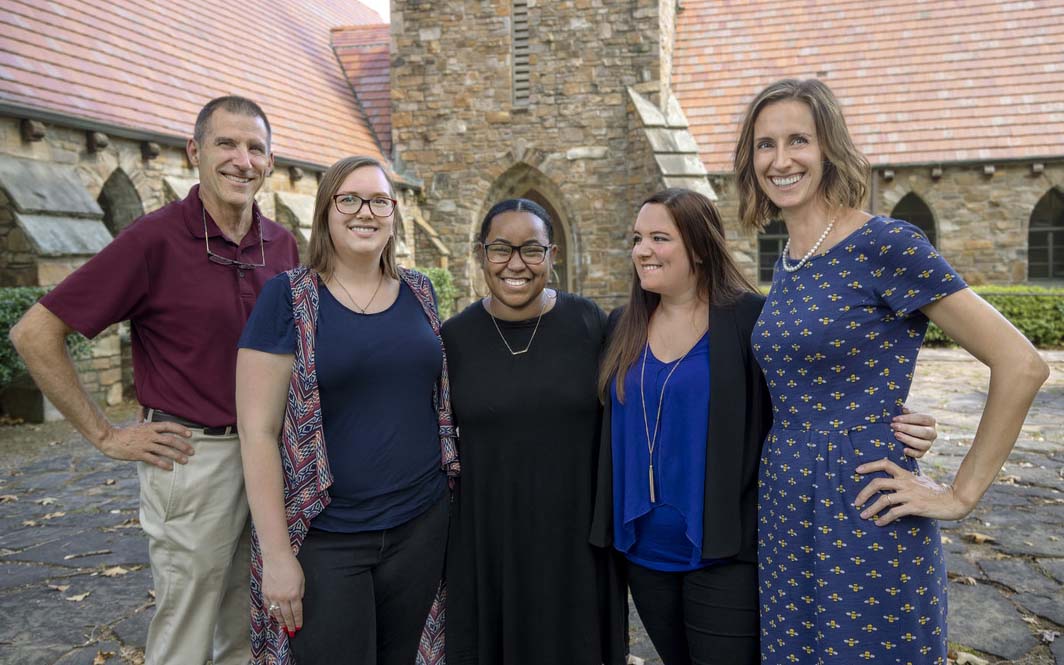UA Little Rock study explores partnerships between nonprofits, congregations
February 10-16, 2020
By Angelita Faller
While many nonprofits and religious congregations partner together to help people in need in the Little Rock area, more partnerships are needed to meet the city’s growing demand for services, according to the results of a University of Arkansas at Little Rock study. The Little Rock Congregations study is an ongoing research project led by Dr. Rebecca Glazier, associate professor in the School of Public Affairs, stemming from research begun in 2012 about the effects of religious organizations on community engagement in Little Rock. Her research partners include Dr. Kirk Leach, assistant professor in the School of Public Affairs, and Dr. Gerald Driskill, professor of applied communication.
Glazier recently released the results of the 2019 survey, which focused on surveying and interviewing nonprofit leaders to learn more about how and when collaborations with congregations occur.
“We were surprised and excited about how open nonprofits are to be working with congregations in Little Rock,” Glazier said. “The lens that we brought to this part of the research was to fulfill a need that we’ve heard about congregations wanting to work with more nonprofits. We saw an overwhelming number of nonprofits that wanted to partner with congregations. We were worried that many might have policies that prevent them from working with religious organizations, but that wasn’t the case.”
Researchers spoke with 118 nonprofit leaders in the Little Rock area, out of 329 that were contacted. The survey found that 70 percent of the respondents have partnered with congregations in the past. All of the respondents who’ve partnered with congregations expressed interest in partnering again. An additional 20 percent of respondents have not had a partnership with a congregation, but expressed interest in doing so, while 7 percent of respondents have no desire to partner with a congregation, and 3 percent reported their nonprofit’s policies don’t allow collaboration with a religious organization.
“A lack of interest is not preventing partnerships,” Glazier said. “Nonprofit policies are not preventing partnership. Nonprofits are actively seeking partnerships. Our conclusion from this data and from the clergy study in 2018 is that more partnerships will happen as more connections across organizations are made. We hope to facilitate such connections throughout 2020.”
The vast majority of respondents (79 percent) are collaborating with other organizations, including congregations, to deliver needed social serves in Little Rock. Of the nonprofit leaders surveyed, 19 percent said they collaborate to connect with the community, 17 because of the topic, and 13 percent as a cost-reduction strategy.
The community services provided by nonprofits are more diverse than those offered by local congregations. In 2018, the study found that marriage and relationship counseling are the most popular services (61 percent) offered by Little Rock-based congregations followed by food pantries (48 percent) and education services (34 percent).
On the other hand, the most common service offered by nonprofits is education (30 percent), followed by healthy eating (17 percent). The diverse range of services provided by Little Rock nonprofits include community gardens, pregnancy testing, and entrepreneurial support, which are all topics that never came up in previous research with congregations. There is a great potential for the expansion of partnerships between nonprofits and congregations to meet the rising needs of the Little Rock community. Out of those surveyed, 80 percent reported an increase in demand for their services.
Glazier feels that two key areas for future collaboration include education, one of the highest service areas offered by both nonprofits and congregations in Little Rock, and food initiatives.
“Many congregations host food pantries and many nonprofits focus on healthy eating education,” Glazier said. “Working together, the two types of organizations could get more and healthier food and better nutrition information to people in need in our community.”
Since the study began in 2012, more than 170 students have conducted research. When the project began, the researchers investigated the impact of community engagement by congregations. Since 2018, they’ve looked more closely at the role of nonprofit organizations.
The 2019 study focused on surveying and interviewing nonprofit leaders to learn more about how and when collaborations with congregations occur. Researchers looked at the impacts of local faith-based community engagement while also providing relevant and meaningful information and resources to the community, such as an interactive map of the city’s food pantries.
“Churches may have been more focused on people in their congregations in the past, but now, more than ever, they’re raising their heads and looking around their community for opportunities to serve,” said Lauri Currier, executive director of The Call.
The Little Rock Congregations Study will continue this year with a survey of congregation members in Little Rock. The surveys will include questions about community issues church members see as most important to the city, what issues they would like their congregations to be active in, and if they are willing to volunteer.
Congregation leaders can use the results to prioritize their community engagement initiatives, while the researchers will connect congregations and nonprofits that are interested in working on the same issues.
“We want to facilitate partnerships between nonprofits and congregations,” Glazier said. “We’ve heard them say they want to make more connections to help the community and to really make a difference for our city. We can make the process so much easier by connecting congregations and nonprofits together.”
Source: UA Little Rock Communications
PHOTO CAPTION:
UA Little Rock professors and student researchers Gerald Driskill, Jessica Olson, Jasmine Pugh, Kaylyn Hager, and Rebecca Glazier are researching how partnerships between churches and nonprofit organizations can provide services to the community in the Little Rock Congregations Study. (Photo by Ben Krain)



